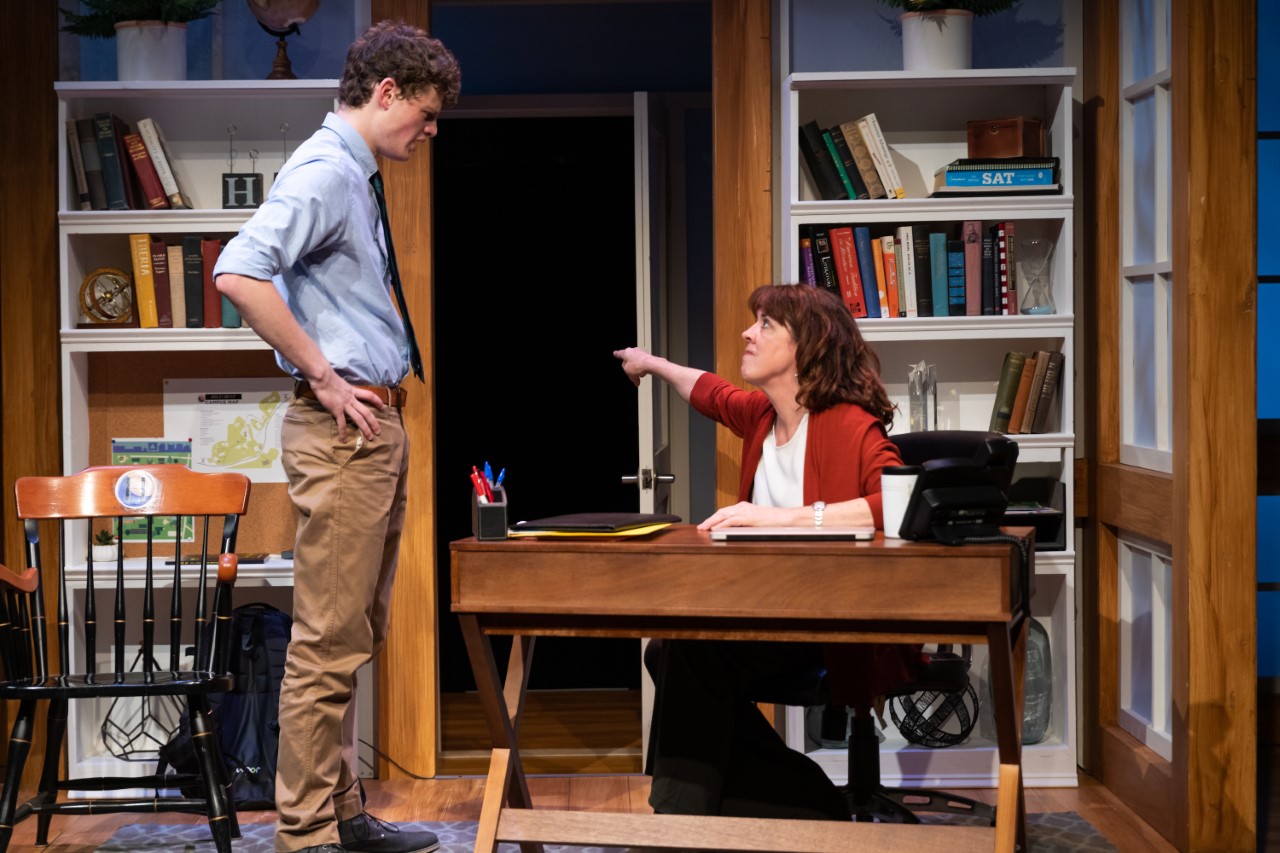SPEAKEASY PRESENTS ‘ADMISSIONS’: A PLAY ABOUT CONFUSED LIBERALS

‘Admissions’ is the third work of Joshua Harmon to appear at SpeakEasy in Boston’s South End. The earlier ones ‘Bad Jews’ and ‘Significant Other’ were very successful. Having just seen ‘Admissions’ I am prepared to say that it is likely that this third play will also be a winner.
‘Admissions’ is more topical than the other two since it addresses the lack of equal opportunity in American education, a problem that has not been solved for many reasons. Those who suffer most are black people and Hispanics.
Harmon’s play deals with a white family – a father, mother, and teenaged son who believe themselves free of prejudice against minorities of color and Hispanics. Their strongest prejudice, particularly the father’s, is against white men.
Both parents work at Hillcrest, a private school in New Hampshire that accepts both local students and those who are going to board there. The father Bill Mason (played by Michael Kaye) is the headmaster; his wife Sherri Rosen Mason (Maureen Keiller) is the admissions officer, and their son Charlie Luther Mason (Nathan Malin) whose parents named him after Martin Luther King is a senior at the school.
The production is timely given the recent college scandals where wealthy and sometimes famous parents bought their children’s admission into prestigious schools. Although the parents we meet in ‘Admissions’ are upper middle class rather than wealthy they do not attempt to buy their children’s way into high level colleges; they do whatever they can to see their offspring in the best college possible.
Charlie’s best friend Perry, a biracial boy, is accepted at Yale while Charlie is put on a waiting list. Although Perry’s white mother Ginnie Peters (Marianna Bassham) and Sherri are close companions, Perry’s acceptance puts an end to their friendship.
At the start of ‘Admissions’ Sherri is scolding Roberta (Cheryl McMahon), an elderly woman who works in development, about some photos she has taken. Since Sherri and her husband want to build up the number of minority students at Hillcrest, Roberta was asked to take pictures for the school catalogue that would give the impression that the number is greater than it is. Sherri believes that if prospective minority pupils see students like themselves they will be more likely to choose Hillcrest, a concept that Roberta has a hard time understanding. Sherri is proud that during her fifteen year tenure at Hillcrest the percentage of minority students has gone from 6% to 18%. Her ambition is to have the school percentage match that of the country. And so the somewhat confused Roberta agrees to take more pictures. Sherri wants to make sure the photos are of minority students doing academic work such as reading a book in English class or using a calculator rather than playing sports. In other words, she wants to keep away from stereotypes although she thinks in stereotypes despite her intelligence.
When Charlie comes home, he is distraught and rushes upstairs ignoring his parents. When he comes down he talks about the unfairness of Perry getting in to Yale while he was put on a wait list despite his better grades. Charlie is convinced the reason is that Perry is black. He then complains about not becoming the Editor-in-Chief of the school newspaper. That honor went to a girl when he feels sure that he would have done a far better job. Bill, Charlie’s father does not offer any sympathy since he does not believe “white guys” deserve any breaks. A hysterical Charlie discusses his background at length. His maternal Jewish grandfather escaped from Germany before the Second World War, but would not have been accepted at an Ivy League School because “seventy years ago” there were quotas keeping Jews out. After this diatribe he goes upstairs.
His Wasp father Bill is disgusted by Charlie’s behavior since it goes against the ideals his parents taught him. His mother Sherri sides with her son who is shocked that his hard work did not bring him the reward he expected. Bill questions Charlie’s Jewishness. Sherrie and Bill quarrel about the importance of going to an Ivy League college. The scene points out the differences in the parents.
Part Two begins several months later when Roberta brings Sherri another set of photos. These show only black students. When Sherri is annoyed by her lack of understanding, Roberta loses her temper because Sherri does not appreciate her hard work. Roberta’s photos of black students sitting together in the dining hall shows the reality of the school.
Several months later Charlie undergoes a change. He is upset by his behavior on the evening after he discovered he did not get into Yale. Given that white privilege now upsets him, he has decided to go to a community college. He believes that because of his choice, his parents can use his college money to help minority students come to Hillcrest. Their reactions are not what was expected. While the play is about opportunity for black youngsters, all the characters are white, a clever choice on the part of Joshua Harmon who has written a work where no one understands anyone else .
SpeakEasy’s production is very well acted and Pau lDaigneault’s directection shows a strong understanding of the piece
‘Admissions’ plays at SpeakEasy, 527 Tremont Street, Boston through November 30.